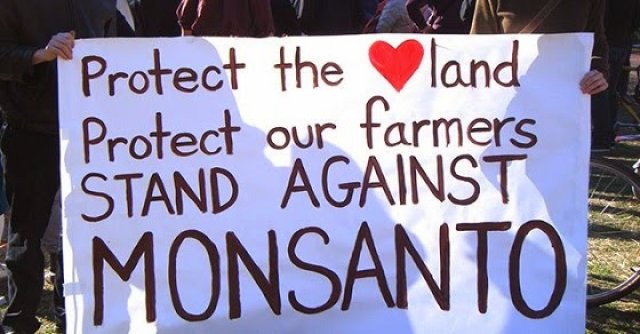
An international March Against Monsanto is scheduled for May 24. Hundreds of events around the world have already been scheduled to protest against the world's biggest agricultural biotechnology company.
Like all capitalist monopolies, Monsanto got to where it is today by being ruthless. There are other big biotech companies with shocking records of disregarding people and planet in pursuit of profit — such as DuPont, Bayer and Dow Chemical — but Monsanto's record is so notorious, it warrants its own special international protest day.
Monsato has a history of aggressively pushing its products and even fundamnetally altering historic agricultural systems. One example is that farmers using its genetically modified seeds are not allowed to keep seeds from their crops to replant. This is a practice carried out since humans geban farming.
Instead, farmers must buy new seed from the company each season. Furthermore, Monsanto's contracts often force farmers to use the comapny's other products, such as herbicides.
There are widespread public concerns about potential health and not all GMOs are necessarily dangerous, there are many concerns about the way powerful corporations such as Monsanto use their influence to weaken or abolish regulations designed to ensure use of GMOs is safe.
The most famous scientific study showing potential harm of GMOs was led by Gilles-Eric Seralini and published in Food and Chemical Toxicology in 2012. It claimed rats devloped tumours and died early when fed GM corn.
The journal retracted the paper last year, saying there was no fraud, but that the small number and type of animal used meant no definitive conclusions could be reached. The authors defend their study, saying the journal's editorial appointment of Richard Goodman, who previously worked for Monsanto, was the real reason behind the retraction.
Studies on animals can, at best, give us only an indication of possible side effects on humans. The real test would be to see what happens when humans consume GMOs for decades, which many are now doing unknowingly.
Only 64 countries now enforce some level of labelling of GMO foods, including Australia and counrties in the European Union. But the US has had several cases of GMO labelling laws being defeated. Notably, the Proposition 37 referendum in California, which would have mandated labelling GMO products, was defeated in 2012.
Supporters of the legislation raised US$8 million to wage the campaign in support of the law, but opponents used $45 million. Monsanto contributed the most to the opposition campaign, $8 million, while other biotech companies that gave about $2 million each.
Despite these setbacks, some states are having success. Vermont has recently passed legislation requiring labelling, which will come into effect in 2016. The state has set up a $1.5 million legal fund in response to Monsanto's threat of a lawsuit.
Even if the state wins, the legal costs would likely consume the entire fund. In a loss it could lose as much as $5 million.
Other states such as Connecticut have passes laws that go into effect when neighbouring states enact similar laws.
Beside affecting human health, GMOs can have adverse effects on environment. On such problem is the creation of superweeds.
Many GM crops are designed to withstand herbicides, such as Monsanto's Roundup. This allows farmers to spray an entire field wth herbicide, killing weeds but leaving the crop unscathed. Monsanto's “Roundup-ready” plant varieties are widely used, especially in the US.
But some of the targeted weeds have natural genetic traits that allow them to survive the herbicide. The spraying wipes out the weeds that can't cope, effectvely leaving the field open to these superweeds, which would otherwise have had to compete with the non-resistant varieties.
In response, farmers must resort to using ever stronger concentrations of herbcide, or turn to new herbicides. But the problem will only repeat itself with the new chemicals.
Some US farmers are now fighting against the introduction of new herbicides and the associated GM crops.
Farmers got Dow AgroSciences to agreed to changes to its herbicides. Monsanto, however, “have just dug their feet in,” said Steve Smith, chairperson of the Save Our Crops group.
“I’m not here to be a salesman for Dow, but I’m here to stand up when people do the right thing,” he said. “Dow did.”
In the EU, GMO cultivation is banned, except for one strain of Monsanto's GM corn. France has recently bannedthe crop.
Monsanto tried to sneak the so-called “Monsanto Protection Act” into a US Senate spending bill last year. This would have stopped the ability of courts to stop the sale and propagation of GMO seeds if problems were found regarding their safety.
The move caused huge anger. Although the secton was removed, it shows the influence Monsanto has on politics.
A report by Food and Water Watch, released last year, found that US government officials were actively promoting Monsanto products overseas. They reviewed over 900 US diplomatic cables from more than 100 countries, published by WikiLeaks.
They found government officials tried to quash public criticism of companies such as Monsanto and facilitated meetings between foreign governments and biotech companies. US diplomats supported Monsanto even after it paid $1.5 million in fines for bribing an Indonesian official.
One cable showed “high-level US government intervention” at the “urgent request” of Monsanto to combat biotech crop opponents in Spain.
“It really goes beyond promoting the US's biotech industry and agriculture,” said Wenonah Hauter, executive director of Food and Water Watch.
“It really gets down to twisting the arms of countries and working to undermine local democratic movements that may be opposed to biotech crops, and pressuring foreign governments to also reduce the oversight of biotech crops.”
[Visit www.march-against-monsanto.com for details of the May 24 global March Against Monsanto.]
